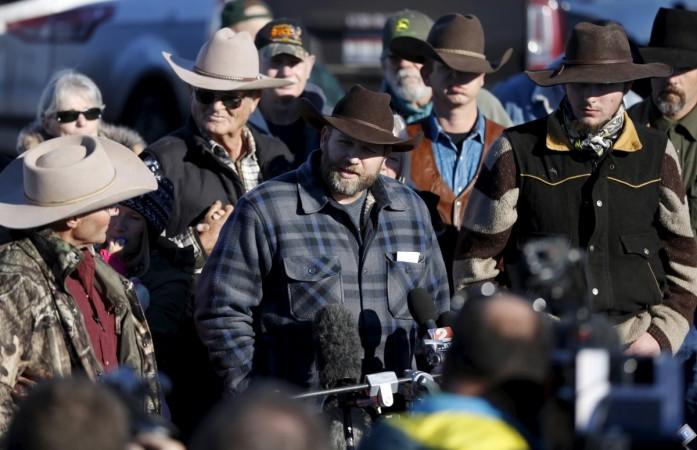
The leader of a month-long armed occupation of a federal wildlife refuge in Oregon urged remaining protesters on Wednesday to leave the site and go home, a day after his arrest and the death of a supporter.
Ammon Bundy, who was taken into custody with several members of his group at a traffic stop along Highway 395, north of the Malheur National Wildlife Refuge in southeast Oregon, urged federal authorities to let his comrades leave the compound without being prosecuted.
"To those remaining at the refuge, I love you. Let us take this fight from here. Please stand down. Please stand down. Go home and hug your families. ... Please go home," Bundy said in a statement read by his attorney, Michael Arnold, following a court hearing.
Jason Patrick, who remained at the refuge following Bundy's arrest on Tuesday, told Reuters by phone that some protesters were leaving on Wednesday afternoon through checkpoints set up by authorities, but rejected the word "surrender."
"I don't know what surrendering looks like," Jason Patrick said. "They're walking through the checkpoint and going home. That's what I've heard unless I'm being lied to."
Patrick added: "It's getting emptier over time, some people leaving, some people still there holding onto what they're holding onto."
Law enforcement surrounded the refuge and blocked off access roads on Tuesday evening, after Bundy and his group were taken into custody at a traffic stop.
Citing the investigation, authorities declined to say what led to the fatal shooting during that confrontation of a member of Bundy's group, identified by activists as Robert LaVoy Finicum, a rancher who acted as a spokesman for the occupiers. Bundy's brother, Ryan, was wounded in the incident.
The arrested protesters were each charged in US District Court in Portland with conspiracy to use force, intimidation or threats to impede federal officers from discharging their duties.
During a brief hearing on Wednesday afternoon, the defendants were ordered held without bail until a detention hearing set for Friday.
The Malheur takeover, which started on 2 January with at least a dozen armed men, was a flare-up in the so-called Sagebrush Rebellion, a decades-old conflict over federal control of millions of acres in the West.
'THIS CAN'T HAPPEN IN AMERICA'
At a news conference earlier in the day, state and federal authorities pleaded with the remaining occupiers to quit their protest, saying they were free to leave.
"Let me be clear: It is the actions and choices of the armed occupiers of the refuge that have led us to where we are today," said Greg Bretzing, special agent in charge of the FBI's office in Portland. "They had ample opportunity to leave the refuge peacefully and as the FBI and our partners have clearly demonstrated, actions are not without consequences."
Federal officials say they had probable cause to arrest Finicum, who told NBC News earlier this month that he would rather die than be detained.
At the same news conference, Harney County Sheriff Dave Ward, his voice breaking, told reporters: "I'm disappointed that a traffic stop yesterday that was supposed to bring peaceful resolution to this ended badly. Multiple law enforcement agencies put a lot of work into putting together the best tactical plan they could, to take these guys down peacefully."
"This can't happen anymore. This can't happen in America and it can't happen in Harney County," Ward said.
On Wednesday morning, an occupier posted what appeared to be a live feed from the refuge on a YouTube page called "DefendYourBase." In it, a few occupiers, some dressed in camouflage, were seen in front of what appeared to be a heavy-duty 320D excavator, at least two of them carrying firearms.
One man spoke on a phone with a person he identified as his mother and offered her reassurance.
"If I die, I died for my country, I died a free man," he said. "That's how I want to die." The man added that his group had "food and everything for the long haul."
Reactions to the takeover from residents in Burns, about 30 miles (48 km) from the refuge, have included sympathy for the imprisoned local ranchers whose plight began the protest, to distrust of the federal government, and dismay at the armed occupation by individuals seen as outsiders.
Many residents said an armed protest was taking legitimate grievances too far, and leaders of a local Native American tribe have urged the occupiers to leave, saying they were scaring the community and that the protesters' ignorance of the region's real history was offensive.
The arrests and shooting have angered anti-government protesters across the country, said Mike Vanderboegh, a gun-rights activist active in self-proclaimed militia circles. "It's all I can do to keep people from going and shooting feds right now," he said.
Vanderboegh said the FBI had acted too quickly to end a situation that was already headed toward peaceful resolution.

















